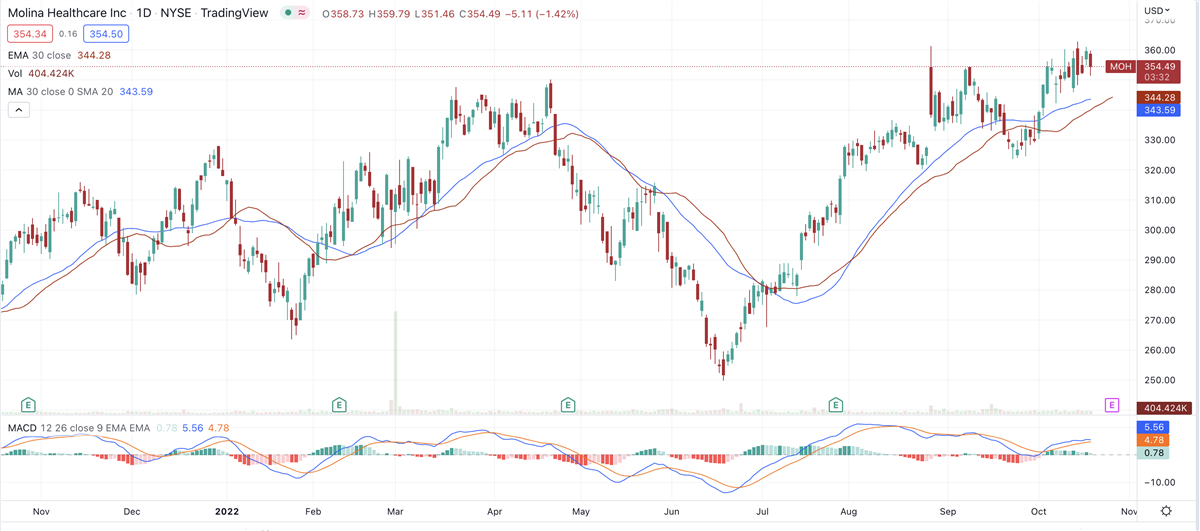
While much-larger industry peer UnitedHealth (NYSE: UNH) tends to get attention, large-cap managed-care provider Molina (NYSE: MOH) has shown better price strength in recent months.

MarketBeat.com – MarketBeat
With a market capitalization of $20.89 billion, Molina is large enough to be tracked by the S&P 500, but it’s dwarfed by UnitedHealth’s market cap of $482.59 billion.
Elevance Health (NYSE: ELV), Centene (NYSE: CNC), Cigna (NYSE: CI) and Humana (NYSE: HUM) are also larger than Molina. However, California-based Molina is the price performance leader in that industry, advancing at the following rates:
- 1 week: +1.96%
- 1 month: +5.96%
- 3 months: +20.66%
- Year-to-date: +13.05%
You don’t see many stocks right now with consistent gains like that, over rolling time frames.
It’s easy to compare that performance against the broader S&P 500, using an ETF such as the SPDR S&P 500 ETF (NYSEARCA: SPY) or the iShares S&P 500 ETF (NYSEARCA: IVV) as a proxy.
When evaluating a stock, it’s also a good idea to compare it against its broader sector. That can show you whether the stock is a top-performing outlier, or whether there is some strength in its sector or sub-industry.
In Molina’s case, you can compare it to the S&P large-cap healthcare sector using the Health Care Select Sector SPDR ETF (NYSEARCA: XLV). That ETF is underperforming Molina by a wide margin, with a year-to-date decline of 9.14%.
As a whole, the managed care industry is doing better than many others. Most of the big players have slightly different business models, with Molina specializing in health insurance through government-administered programs, including Medicare and Medicaid.
In a possible harbinger for other insurers, UnitedHealth topped analysts’ views when it reported earnings on October 14.
Molina broke out of a cup-with-handle base in mid-March and rallied to a high of $350.19 on April 21 before rolling over. That timing is notable, because the S&P 500 made multiple failed rally attempts, and on April 21, an attempt fizzled well below its previous high of 4818, reached in early January.
Molina went on to form a constructive double-bottom pattern, with a low of $249.78 on June 17. That undercut the previous structure low of $263.64 from January, which set the stage for a new run-up. It may seem a bit counterintuitive, but when a stock falls to a level where institutions see the benefit of scooping up shares at a lower valuation, a new rally can begin.
After clearing a buy point above $315.91, Molina began crafting a flat base in late August. Shares rallied to an all-time high of $362.75 on October 14. The stock was trading lower, along with the broader market, on Wednesday. 
With any stock that’s posted market-beating price gains, the question always is: Can the rally be sustained?
Some of the upward price action is dependent on the broader market, as well as the company’s own prospects. MarketBeat earnings data show Molina growing revenue at double-digit rates in each of the past eight quarters. Bottom-line growth has been more erratic, but Molina beat analysts’ views for four quarters in a row.
The company reports third-quarter results on October 26, with analysts expecting earnings of $4.25 per share on revenue of $7.69 billion. Both would be year-over-year increases.
Molina certainly has some characteristics of a growth stock, but its price-to-earnings ratio of 24 is not outlandish, and at any rate, growth investors are generally OK with paying up for a stock whose future seems bright.
Wall Street expects Molina to earn $17.71 per share this year, a 31% increase. Next year, analysts see the company earning $20.08 per share, a gain of another 17%. MarketBeat analyst data show a consensus rating of “hold” with a price target of $345.20, down slightly from where the stock was trading Wednesday.
